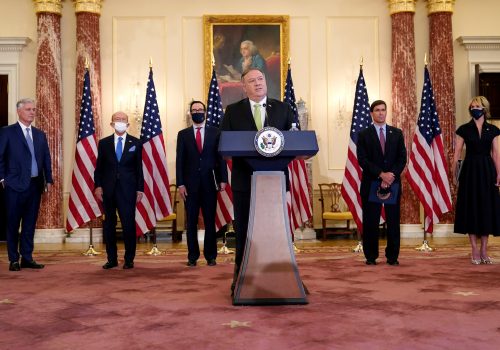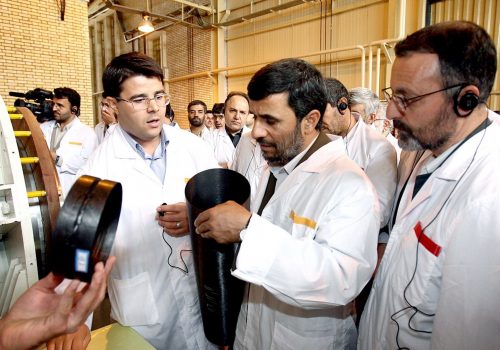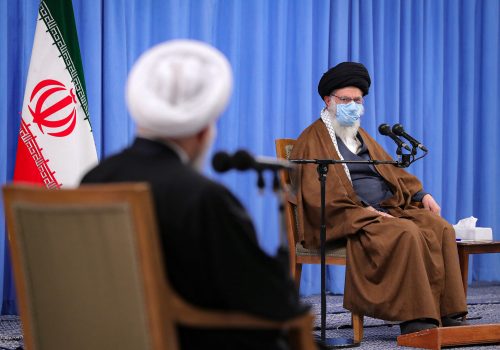Rising concerns over the US-Iran impasse: A European view
Two months after the Joe Biden administration took office, concerns are growing about the lack of progress between the United States and Iran.
No breakthrough on the two sides returning to compliance with the Joint Comprehensive Plan of Action (JCPOA) has happened. Regional tensions are on the rise again. Rockets fired by Iran-backed militias are hitting on or near bases in Iraq that house American troops. The Houthi rebels in Yemen have launched repeated missile attacks against Saudi Arabia. An Israeli ship was the victim of an incident in the Persian Gulf and an oil slick has fouled Israeli beaches.
In retaliation for the missiles fired by an Iran-backed Shia militia at an American military facility in Erbil that killed a US contractor, the US mounted strike on a contingent of that militia in Abu Kamal, Syria, on February 25.
All observers knew that the will to return the US to the JCPOA, displayed by Biden during his presidential campaign, would face implementation difficulties. The vexing problem of “sequencing” was anticipated—who would take the first steps and how would the two countries synchronize the necessary measures to revive the agreement?
The new administration, admittedly focused on the coronavirus, economic crises, and getting its nominees confirmed by a closely divided Senate, was rather slow to act on Iran.
Its first moves took several weeks. The US on February 18 recanted the declaration made by the Donald Trump administration on September 20, 2020, asserting that United Nations sanctions on Iran had been reimposed through the “snapback” mechanism. On the same day, during a meeting between Secretary of State Anthony Blinken and his E3 counterparts—Germany, France, and the United Kingdom—the US declared itself ready to resume discussions with Tehran without making Iran’s prior return to full compliance with the JCPOA a precondition.
However, Iranians expected more tangible actions upfront to ease sanctions—such as freeing up some of its assets frozen in foreign banks and waivers on certain exports—that never came. They have so far refused the offer to attend talks under European auspices.
At the same time, Iranian authorities rendered Washington’s efforts to achieve a breakthrough more laborious. While Iranian Foreign Minister Mohammad Javad Zarif sent some positive signals, the law adopted by Iran’s parliament on December 3, 2020—essentially an ultimatum to the US to lift sanctions within three months or Iran would stop allowing intrusive inspections of its nuclear facilities—made it difficult for Washington to compromise.
Iran has started to carry out other violations called for by the new law, including enriching uranium to near 20 percent and installing advanced centrifuges, maintaining that all these steps are reversible. While announcing that Iran would no longer observe the Additional Protocol of the nuclear Non-Proliferation Treaty (NPT), Iranian authorities managed to reach a technical agreement with the International Atomic Energy Agency (IAEA), ensuring continued monitoring and verification of Iranian facilities until late May.
As Iran has hardened its stance, the Europeans have tried but have been unable to play the honest broker.
Some German and French declarations at the end of last year and the beginning of 2021 may have raised doubts in Tehran. The two capitals reiterated, in what may have been ill-timed remarks, that a return to the nuclear accord should pave the way for broader negotiations, particularly on missiles and regional issues. These would, of necessity, involve other regional actors.
Since then, the Europeans have made clear that the priority is the return of Iran and the United States to full JCPOA compliance. The EU High-Representative for Foreign Policy Josep Borrell, who acts as the coordinator of the JCPOA Commission, may be able to play a useful role in this regard. Secretary of State Blinken, when visiting Brussels on March 23-24 for a NATO meeting, may find it of interest to consult with the E3 and the High Representative. That should be an opportunity for the Europeans to review their options and see if something more could be done vis-à-vis Tehran.
The other complicating factor is the approaching Iranian presidential elections in June. Many observers have warned that hardline factions would prefer that sanctions not be lifted before the June 18 vote to avoid giving the pragmatist/reformist candidate any advantage. President Hassan Rouhani himself accused his opponents of adding fuel to the fire to strengthen their hand in the electoral struggle. On the other hand, President Biden’s room for maneuvering is constrained by the negative attitude of many in Congress—including influential members of his own party—toward dialogue with Iran.
These differences over tactics suggest doubts in Washington and Tehran about the value of making considerable efforts to revive an agreement that has admitted flaws and that proved so vulnerable to a change of US administration.
However, beyond the important non-proliferation benefits of the agreement, the nuclear agreement should be seen in the light of concerns about the rise of China. A prolonging of the Iranian crisis risks further embedding the US in the Middle East’s turbulence, contrary to its wish to focus on the Indo-Pacific.
For Iran, continued hostility with the US and strained ties with Europe may force it to give up its historic aim of dependence on “neither East nor West” and to depend entirely on China for its economy and to some extent on Russia for regional security.
Thus, a return to the JCPOA offers the best prospect of bolstering Iranian independence and freeing the US from its Middle East burdens. Whether that can still be achieved is a growing concern.
Ambassador Michel Duclos a nonresident senior fellow at the Atlantic Council’s Rafik Hariri Center for the Middle East and a senior advisor to the Institut Montaigne. Follow him on Twitter: @MrjDuclos.
Image: Josep Borrell, High Representative for Foreign Affairs and Security Policy and Vice-President of the European Commission holds a news conference after a European Union foreign ministers emergency meeting to discuss ways to try to save the Iran nuclear deal, in Brussels, Belgium, January 10, 2020. REUTERS/Francois Lenoir


